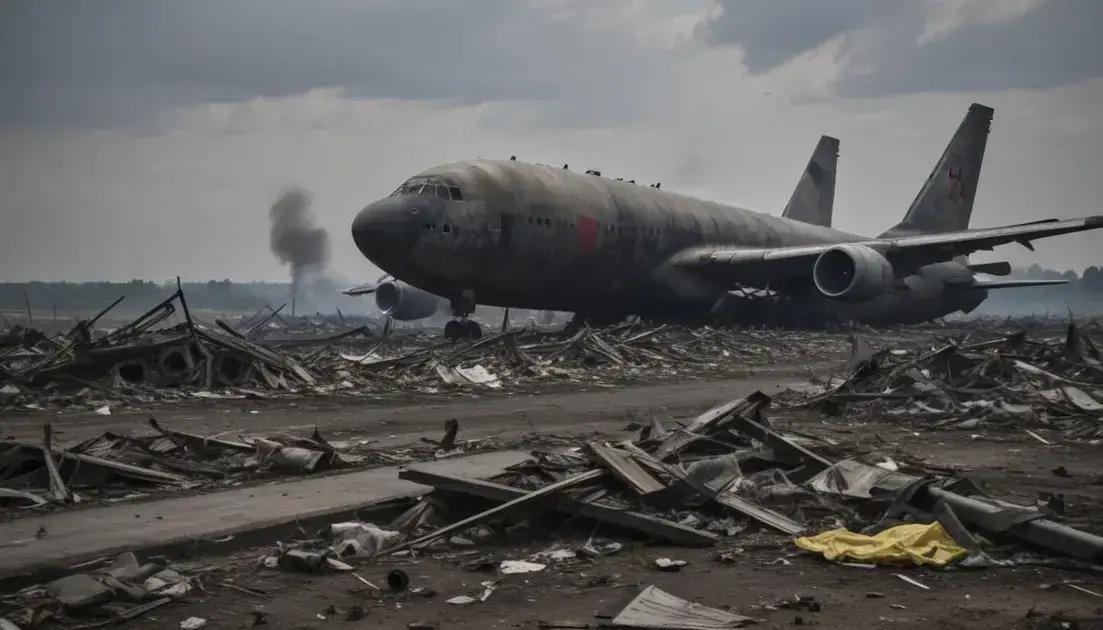
Flight MH17: What Happened to the Plane Shot Down in Ukraine in 2014
The downing of Flight MH17 in 2014 had significant repercussions, impacting international relations, particularly between Ukraine and Russia. Investigations revealed it was shot down by a missile traced back to Russia, leading to global condemnation and sanctions against Russia. This tragedy not only highlighted the dangers of flying in conflict zones but also prompted changes in airline policies for safer travel. The ongoing calls for accountability and justice continue to influence discussions around air travel safety and geopolitical tensions.
MH17 incident is one of those tragedies that shook the world. On July 17, 2014, the Malaysia Airlines flight was brought down, leading to profound international implications. Curious about what really happened? Let’s delve in.
The Flight Details
The flight details of Flight MH17 are crucial to understand this tragic event. On July 17, 2014, Malaysia Airlines operated the flight. The plane was a Boeing 777-200ER, known for its safety and reliability. It took off from Amsterdam, Netherlands, heading to Kuala Lumpur, Malaysia.
There were 298 people on board, consisting of passengers and crew. Sadly, all lives were lost when the plane was shot down. The flight was cruising at an altitude of roughly 33,000 feet when it was hit.
Many passengers were from various countries, including the Netherlands, Australia, and Malaysia. This tragedy impacted families worldwide, uniting people in grief. Nearby conflict heightened the tension, raising important questions about air safety in warzones.
The incident sparked international discussions on flight protocols in areas of conflict. Authorities realized the need for better safety measures to protect travelers. With ongoing warfare in Ukraine, airlines began reconsidering flight paths and safety assessments.
Flight MH17 is not just a number; it represents lives lost and the uncertainty of flying over conflict zones. Understanding these details helps us remember the victims and advocate for safer skies.
International Investigations
The international investigations into Flight MH17 were extensive and thorough. Many countries worked together to determine what happened. The Netherlands led the investigation since most victims were Dutch.
Experts from various nations joined the effort. They included teams from Australia, Malaysia, and Ukraine. They used advanced technology to analyze data from the flight recorders. This data played a crucial role in understanding the incident.
The investigation revealed that the plane was shot down by a surface-to-air missile. This missile was identified as a Buk missile, which can travel long distances. It was traced back to Russia, raising serious concerns.
International authorities focused on gathering evidence from the crash site. They searched for missile fragments and other important clues. Their work faced challenges due to ongoing conflict in Ukraine. Access to the site was often dangerous.
The final report was released in 2015, confirming that the plane was brought down by a missile. This report sparked discussions on accountability. Many nations called for justice for the victims and their families.
These investigations highlighted the need for safer air travel. They also raised awareness about flying over conflict zones. The global response aimed to prevent future tragedies like the MH17 incident.
Consequences for Russia
The consequences for Russia after the downing of Flight MH17 were significant and far-reaching. Many countries reacted swiftly with strong condemnation. These reactions shaped international relations in a major way.
One major consequence was the imposition of sanctions against Russia. The European Union and the United States targeted Russian businesses and officials. These sanctions aimed to pressure Russia to change its actions in Ukraine.
Relations between Russia and Western nations deteriorated. Countries that once had cooperative ties became increasingly wary of Russia’s intentions. This event added fuel to the ongoing conflict between Ukraine and Russia.
Additionally, Russia faced criticism for its involvement in the conflict. This incident highlighted the dangers of military actions in civilian areas. Many called for accountability for the loss of innocent lives.
Media coverage of the incident was extensive, leading to greater public awareness. The tragedy served as a potent reminder of the impact of geopolitical tensions.
Russia also struggled to maintain its image on the global stage. Despite attempts to deny responsibility, evidence pointed to its involvement. This situation raised questions about safety in air travel over conflict zones.
Overall, the consequences for Russia went beyond just political measures. The outcry over Flight MH17 changed the narrative around the Ukraine conflict, influencing public opinion worldwide.
Impact on Ukraine-Russia Relations
The impact on Ukraine-Russia relations following the MH17 tragedy was profound and lasting. This incident deepened the existing tensions between the two nations.
After the plane was shot down, feelings of anger and grief spread across Ukraine. Many blamed Russia for supporting the separatists in eastern Ukraine. This fueled national pride and solidarity among Ukrainians.
International scrutiny of Russia’s actions increased as well. Countries rallied around Ukraine, condemning the attack. This unified response highlighted the importance of international support in times of crisis.
Ukraine enhanced its military presence in response to the ongoing conflict. The government sought more Western support for defense and security. NATO became more involved, further complicating relations with Russia.
Media coverage of the incident kept the situation in the spotlight. This constant attention pressured leaders on both sides to take a stand. Protests and public demonstrations in support of Ukraine grew louder globally.
Diplomatic relations suffered, with both sides accusing each other of aggression. Sanctions imposed on Russia hit its economy hard, leading to more tensions. The struggle for control over eastern Ukraine continued unabated.
Overall, the MH17 tragedy marked a turning point. It solidified Ukraine’s resolve and heightened global awareness of its plight. The incident became a symbol of the ongoing conflict and its devastating effects.
Ongoing Repercussions
The ongoing repercussions of the MH17 tragedy are felt even today. This event still influences global politics and air travel safety. Many nations are more cautious about flight routes in conflict zones.
The mourning for the victims continues. Families seek justice and answers regarding the incident. Their pain is still very real as they remember lost loved ones.
Internationally, the call for accountability remains strong. Many countries have pushed for a proper investigation and sanctioning against those responsible. This pressure keeps the issue alive in global discussions.
Airlines have changed their policies. They now avoid flying over dangerous areas when possible. This shows a clear shift towards prioritizing passenger safety above all. Travelers are more aware of their flight paths and risks involved.
Media attention on the case has not faded. Documentaries and articles continue to explore the implications. These stories remind the public of the costs of conflict and war on innocent lives.
On a political level, the MH17 incident contributes to ongoing tensions between Russia and the West. Relations remain strained, affecting trade and diplomacy. The incident serves as a reminder of the fragile peace in some regions.
Moreover, the tragedy has sparked discussions about global air traffic regulations. Many advocate for stronger rules to prevent similar incidents in the future. This collective effort aims to ensure safer skies for everyone.
Conclusion
In conclusion, the tragic downing of Flight MH17 has left a lasting impact on many levels. It reshaped international relations, especially between Ukraine and Russia, and highlighted the importance of safety in air travel.
The ongoing repercussions remind us of the need for accountability and justice for the victims. As countries work together to prevent similar tragedies, we see a shift towards greater awareness and caution regarding flights in conflict zones. This event not only changed how airlines operate but also strengthened the call for safer skies.
Ultimately, the memory of those lost in this tragedy continues to inspire actions aimed at ensuring that such an incident never happens again. The pain felt by families and nations alike reinforces the need for vigilance in protecting innocent lives.


